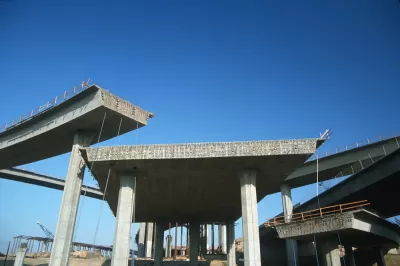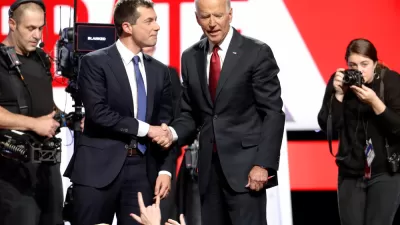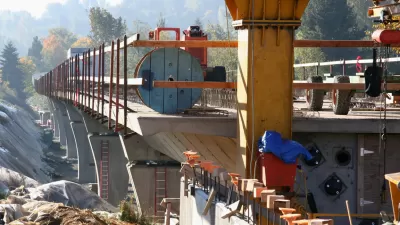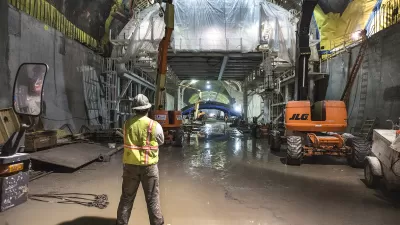While there are many reasons to break away from automobile dominance, the RAISE grant program is the only federal effort fully reflecting a public transit and active transportation priorities.

Laura Bliss reports for Bloomberg CityLab on the potential of the first round of RAISE grant program funding, announced on November 19 by the U.S. Department of Transportation, to make substantive changes to the pro-automobile priorities established by its predecessor program, the Trump administration's BUILD grant program, and over a century of U.S. transportation planning.
According to Bliss, the nearly $1 billion allotted by the RAISE grant program is much more focused on alternative transportation modes (i.e., not road expansion projects). "[O]nly about 5% of RAISE funds will support new roads, and 10% will go to projects that increase road capacity," according to Bliss. "The rest will flow to a mix of projects such as a freeway cap in Atlanta, a greenway project in Cincinnati, transit planning in Omaha, Missoula and Charlotte, and pedestrian and bike safety improvements in Denver, Oakland and Wilmington."
Bliss notes that the financial equation differs greatly from the Infrastructure Investment and Jobs Act (IIJA), which despite spending a record amount on alternative transportation projects also includes record amounts for road building (without the previously planned guardrails that would have made it more challenging for state departments of transportation from spending federal funding on the transportation status quo).
The article includes more insight from transportation experts about how to track and evaluate the use of both RAISE and IIJA funds in the coming months and years.
FULL STORY: Car-Free Transportation Gets Boost from U.S. Grant Program

Maui's Vacation Rental Debate Turns Ugly
Verbal attacks, misinformation campaigns and fistfights plague a high-stakes debate to convert thousands of vacation rentals into long-term housing.

Planetizen Federal Action Tracker
A weekly monitor of how Trump’s orders and actions are impacting planners and planning in America.

San Francisco Suspends Traffic Calming Amidst Record Deaths
Citing “a challenging fiscal landscape,” the city will cease the program on the heels of 42 traffic deaths, including 24 pedestrians.

Defunct Pittsburgh Power Plant to Become Residential Tower
A decommissioned steam heat plant will be redeveloped into almost 100 affordable housing units.

Trump Prompts Restructuring of Transportation Research Board in “Unprecedented Overreach”
The TRB has eliminated more than half of its committees including those focused on climate, equity, and cities.

Amtrak Rolls Out New Orleans to Alabama “Mardi Gras” Train
The new service will operate morning and evening departures between Mobile and New Orleans.
Urban Design for Planners 1: Software Tools
This six-course series explores essential urban design concepts using open source software and equips planners with the tools they need to participate fully in the urban design process.
Planning for Universal Design
Learn the tools for implementing Universal Design in planning regulations.
Heyer Gruel & Associates PA
JM Goldson LLC
Custer County Colorado
City of Camden Redevelopment Agency
City of Astoria
Transportation Research & Education Center (TREC) at Portland State University
Jefferson Parish Government
Camden Redevelopment Agency
City of Claremont





























